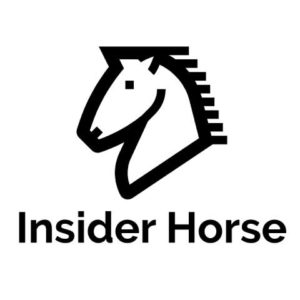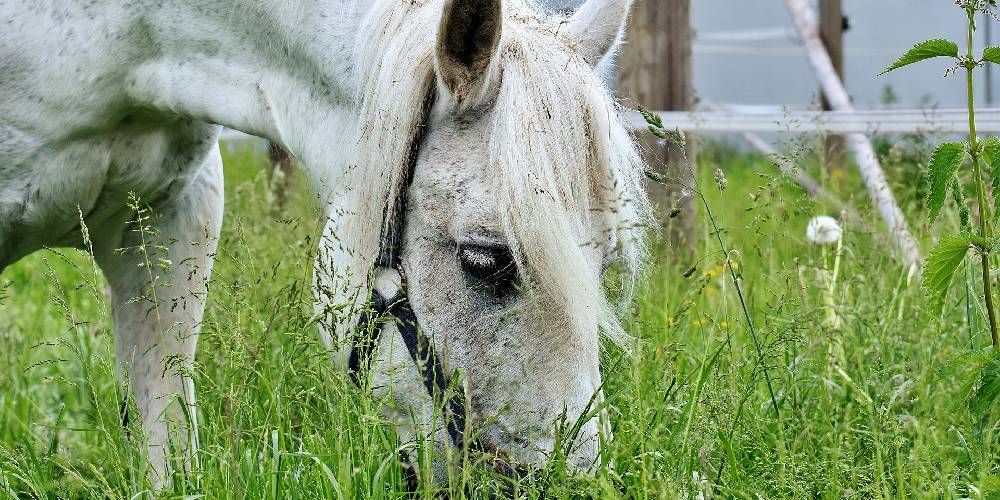I was thinking the other day, if horses can graze on grass all day long, then they must be able to eat the glass clippings after someone mows the lawn. Wrong! Horses are not supposed to eat mowed grass. But why? Is there a way to make this safe for horses to eat? And why is it bad for horses to consume?
In this guide, I discuss:
- Whether or not horses can eat mowed grass
- Why they can’t eat freshly mowed grass
- What eating mowed grass can cause in horses
- Whether or not horses can eat dry grass clippings
Can Horses Eat Freshly Mowed Grass Clippings?
Horses should never eat freshly mowed grass. This is because grass needs time to dry before it is suitable for a horse’s consumption. Generally, horses eating fresh grass will just graze on it slowly and smell around for good grass to eat. If it is cut already and put somewhere for them to just eat on their own, it can cause a number of issues when they eat it because they tend to eat it too quickly. Grass clippings can contain a lot of bacteria and potentially mold due to the moisture which can be dangerous for horses and cause fatal stomach problems.
What Are Some Reasons Why Horses Can’t Eat Fresh Grass Clippings:
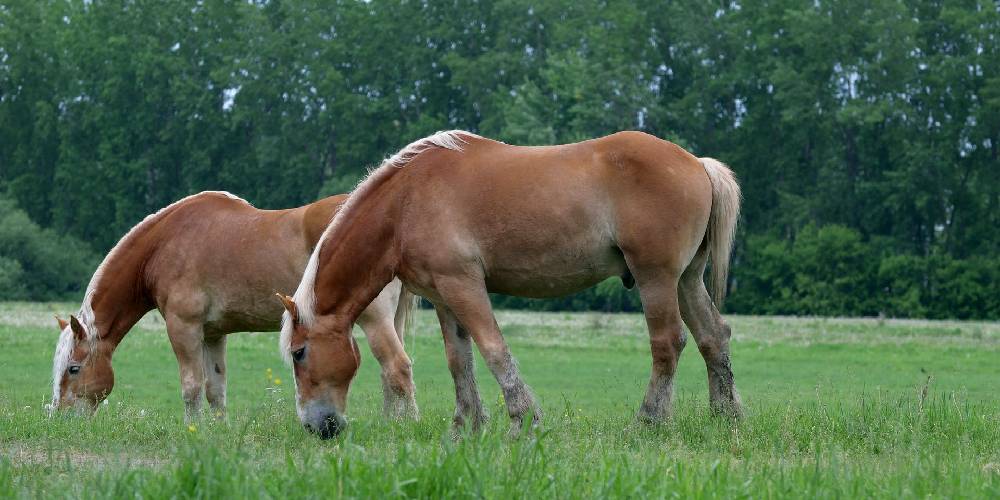
- Horses eat the grass too fast without properly chewing it
- Fresh clumps of cut grass clippings attract mold and bacteria which can be detrimental to a horse’s health
- Fresh grass is a lot softer than the typical dry hay that horses eat. It is also sweeter and tastier so horses tend to overeat grass clippings
Health Concerns Caused By Eating Grass Clippings
Choke
Choke is an issue seen in horses where food or another object blocks the esophagus and doesn’t allow any other food or water into the stomach.
The main cause for choke is the horse not completely chewing their food all the way which can make it difficult for the horse to swallow its food.
With this being said, it is known that horses tend to gobble down grass clippings pretty quickly. Because of that, the horse is more likely to choke on those clippings than they would on a feed that they eat slower or on grass that they naturally grazed on.
A choking horse will demonstrate a number of symptoms that can tell you that your horse is choking. Some of the most commonly seen symptoms of choke are:
- Drooling
- Uninterested in food and water
- A low hanging head
- Coughing
- Shaking the head downwards
- Increased heart rate
- Mucus coming out of the nose.
If any of these things are seen, call a vet immediately to treat the choke before your horse begins to get dehydrated and suffer from other issues.
Colic
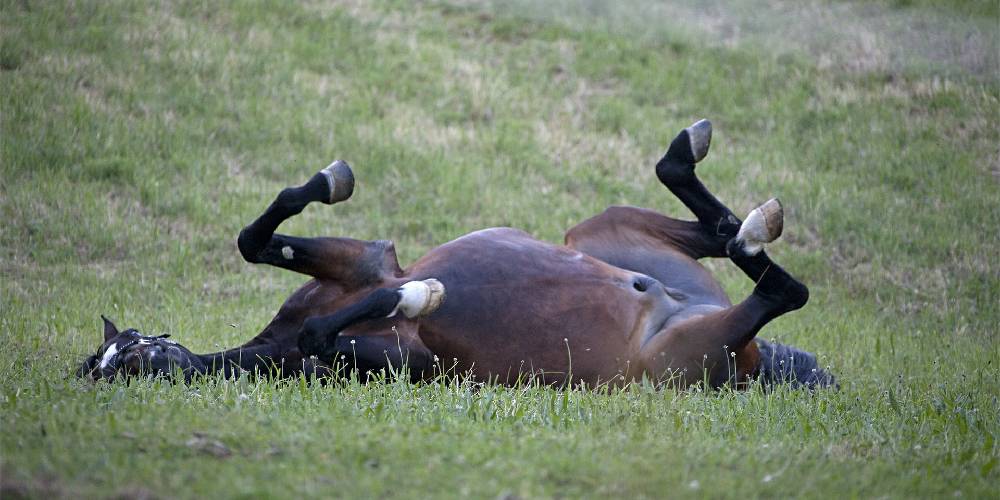
Colic is the top killing issue in the horse world. More horses die colicking than they die from anything else. A horse can potentially colic from eating grass clippings.
The most common reason a horse colics from grass clippings is because they ate some grass that was growing bacteria or mold.
Bacteria likes to grow in warm moist conditions, and these conditions can be provided in a clump of freshly cut grass. This is one of the biggest reasons horses should NEVER eat these clippings.
With grass clippings being the perfect incubator for bacteria and mold, it is important to make sure your horse never ingests them.
Some of the symptoms your horse might show that indicate they are suffering from colic include:
- Dehydration
- Excessive rolling
- Increased heart rate
- Kicking at the belly
- Sweating
- Signs of shock (failed capillary refill test)
- Biting at the belly
If you see any of these symptoms in your horse whether they ate grass clippings or not, call your veterinarian immediately.
Colic can worsen quickly if it is not treated soon enough.
Laminitis
Laminitis is a progressive condition found in the hooves of horses of all ages, breeds, colors, and types. Laminitis is mainly caused from the horse’s genetics and diet and if they eat food with extremely high levels of sugar or starch.
Freshly mowed grass has really high levels of sugar because the plant is still processing glucose and is still functioning as it would when in the ground. Because of this, laminitis is a concern as the levels of sugar in the grass in the quantities the horse will try to eat it in are too high to be healthy. If the horse continues to eat this grass regularly, laminitis can be in their future.
Can Horses Eat Dry Grass Clippings?
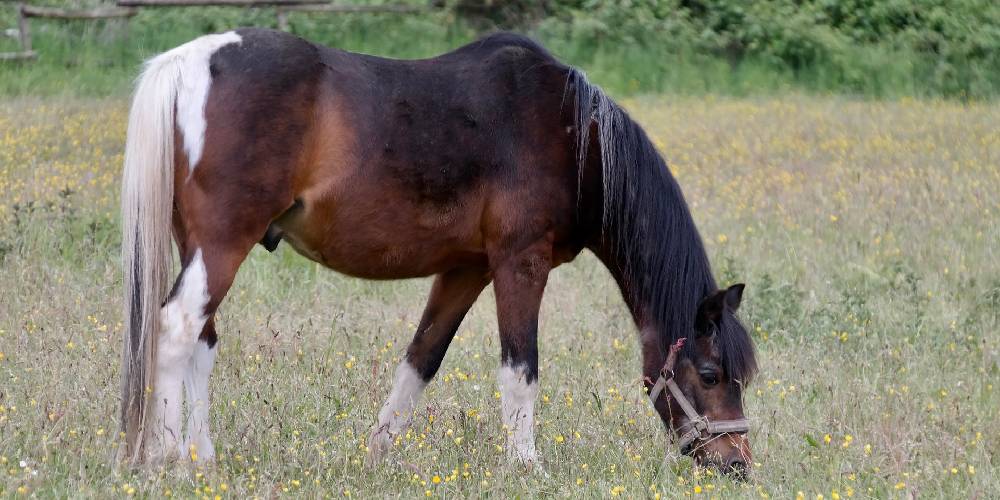
Yes they can. If you think about it, hay is basically just dry grass clippings. However, before you let your horse even go near those grass clippings, make sure that they are COMPLETELY dried out. If they aren’t mold and bacteria could have taken over and that is not something that you want your horse ingesting.
How Long Does It Take For Grass Clippings To Dry Out?
Generally, in dry climates, it only takes about one to two days for the grass to dry out enough for a horse to safely consume it.
In more muggy humid climates, you may want to give it about three to seven days to dry out just in case the grass is not yet dry.
